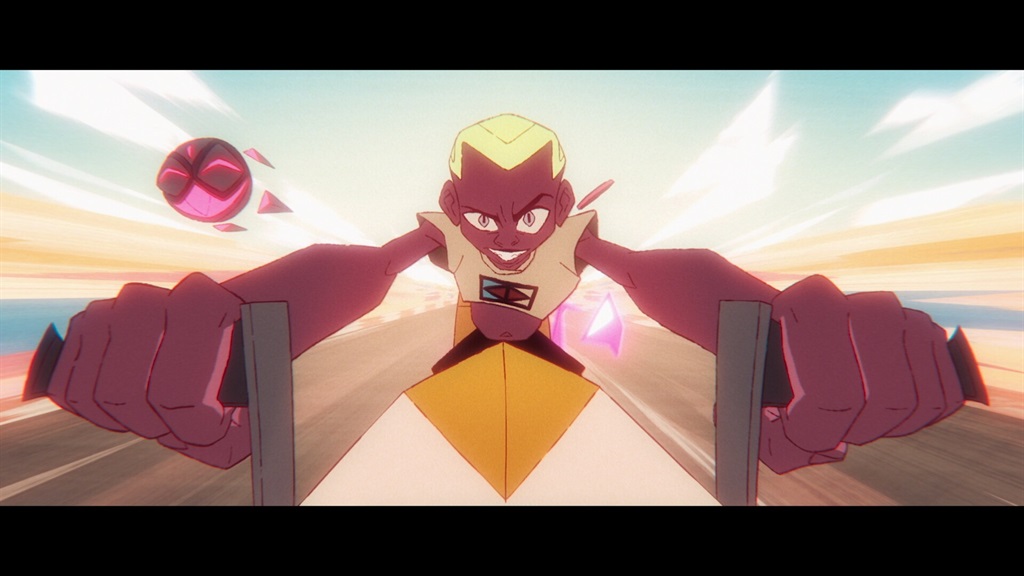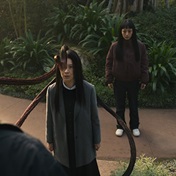
This action-packed animated sci-fi anthology presents ten futuristic visions from Africa inspired by the continent’s diverse histories and cultures. Executive produced by Oscar-winning director Peter Ramsey, these ten short films made by a new generation of animation creators draw on uniquely African perspectives to imagine brave new worlds of advanced technology, aliens, spirits, and monsters. This is Africa as you’ve never seen it before.
Animation is entangled with the history of cinema, and yet it is still overlooked in parts of the world. Recently, African animation has been taking up more international spotlight and in this fruitful period comes Disney's Kizazi Moto: Generation Fire, an anthology series of ten animated shorts, all by African creators. Each short is beautifully animated, featuring a diversity of styles. The series is a sample of what creators across Africa can do if given the platform.
Kizazi Moto has creators from South Africa, Nigeria, Zimbabwe, Uganda, Kenya, and Egypt. Each short comes with a different angle from an African perspective. The Afro-futurist series focuses on themes of technology, social media, modernisation and other science fiction topics. Peter Ramsey, known for his involvement in the Spider-verse franchise, was enlisted to be the executive producer for the series. The animation studio Triggerfish, based in Cape Town and Ireland, was also chiefly involved in Kizazi Moto's production.
Each short tells its own story with its own visual approach. Episodes have 3D, 2D and hybrid animation, creating a dynamic visual experience. The character designs, use of colour and world-building are constantly awe-inspiring. However, the quality of writing varies. In some episodes, particularly Mkhuzi: The Spirit Racer, the focal point is intense action and jaw-dropping visuals, while others examine larger ideas surrounding tradition, humanity and our relationship with nature and technology. The compact length of the episodes results in these ideas needing more time to be explored.
The stories move extremely quickly, making it difficult to keep up. You're thrust into an expansive world burgeoning with fascinating concepts, but before you can take it all in, credits roll. There are also similarities between the plots of the episodes, but because they are based on common ideas in African tradition, those similarities are appropriate. For instance, Mukudzei and First Totem Problems are both about a character entering an alternate reality and seeking a way to escape. The similarities also make the disparate episodes link together cohesively while avoiding major redundancies.
READ MORE | First Disney+ African original will 'blaze a trail for future generations of storytellers'
Herderboy
The first short is about a boy who wants to become a herder. The science-fiction twist is that cattle are essential for resources and protected through hi-tech equipment and highly skilled guardians. The episode sets up the series running theme of tradition meeting futuristic technology.
Herderboy sets up medium expectations for the rest of the series. Though a strong introduction regarding visuals and technical feats, the plot is ill-fitted for the episode's brevity (which becomes a frequent issue with the other episodes).
Mkhuzi: The Spirit Racer
In this short film, a Sowetan boy must save his neighbourhood by defeating a formidable racer. The episode is filled with expressive character designs and high-adrenaline racing sequences. The short features the series' best use of music. Every frame and sound is used to add to the lightning pace. Mkhuzi probably has the most rewatch value and will leave you wishing it had its own extended series.
Moremi
Moremi focuses on a spirit child retrieved from an alternative realm by a mysterious human. The central plot is straightforward, but the episode throws a lot of information at you in ten minutes. Though the animation is still gorgeous, most of the time you're trying to figure out what's going on.
Surf Sangoma
Surf Sangoma tells the story of a young surfing instructor who overcomes his guilt and fear caused by an old tragedy. This is one of the more unsettling episodes, with scenes that will make your skin crawl. The dialogue is also sprinkled with South African slang and phrasings, which some viewers will appreciate. The story covers a lot of ground but still feels underdeveloped, resulting in wasted potential.
First Totem Problems
This episode has the series' most ambitious attempts at world-building. It effectively makes the audience understand the culture and traditions of the characters. A young girl is on her way to a coming-of-age ritual where she will receive an ancestral totem. The short film is incredibly original and creative. Though it threatens to drown in its own ambition, it manages to keep its head above water.
Mukudzei
This episode warns of the dangers of clout chasing. A boy tries to maintain his online virality by performing an extreme form of live-streamed graffiti. The Gen Z pandering and inability to emotionally engage its audience make this one of the weaker episodes. It's still fun and exciting but leaves much to be desired.
Hatima
At the forefront of Hatima is the exploration of setting and history. The substance Hatima is used by two populations, one for healing and the other for violence. There is less focus on plot, which really benefits the episode. The emphasis on exposition results in greater immersion.
Stardust
Stardust has a North-African setting, in a world where people's fates are determined by scrolls. A girl is given an empty scroll, leaving her to create her own destiny. It is one of the more forgettable entries of the series, but it has a strongly written lead character. The sun-kissed 3D animation also does a wonderful job of bringing out the desert-like atmosphere.
You Give Me Heart
Writing a decent romantic story in under 11 minutes isn't easy, but You Give Me Heart manages to pull it off. The main story concerns a young creator who tries to become a god by amassing 1 million social media followers. However, the way the episode merges ideas of social media and mythology doesn't really work, and its humour is weak.
Enkai
The final short is about a mother who tries to shelter her daughter from a hostile world filled with exploitation, class division and dwindling resources. The episode also emphasises the importance of creativity and escapism. It echoes the idea of Afrofuturism itself, where people can create alternative realities that resist colonial perspectives and ways of interacting with the world. It puts the power back into the hands of Africans to create a world suited to their ways of living.
Africa's growing space in animation
Though an imperfect collection of short films, Kizazi Moto: Generation Fire is important for what it represents: Africa's growing space in animation. Each episode illustrates that the skill and dedication of African creators can compete on the international stage. Kizazi Moto: Generation Fire is a positive sign that Africa's future in animation is in good hands.
WATCH THE TRAILER HERE:




 Publications
Publications
 Partners
Partners












